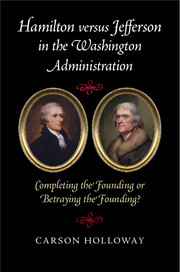 Hamilton versus Jefferson in the Washington Administration
Hamilton versus Jefferson in the Washington Administration Book contents
- Frontmatter
- Dedication
- Contents
- Acknowledgments
- 1 Introduction
- PART I A DEBATE BETWEEN CABINET COLLEAGUES
- 2 Establishing the Public Faith: Hamilton's Report on Public Credit
- 3 First Signs of Division: Assumption and the Back Pay Bill
- 4 Establishing Energetic Government: Hamilton's Report on a National Bank
- 5 Defending Limited Government: Jefferson's Critique of the Constitutionality of the National Bank
- 6 Defending Energetic Government: Hamilton on the Constitutionality of the National Bank
- PART II A CLASH OF RIVAL PARTY LEADERS
- PART III Founding Foreign Policy
- Index
5 - Defending Limited Government: Jefferson's Critique of the Constitutionality of the National Bank
from PART I - A DEBATE BETWEEN CABINET COLLEAGUES
Published online by Cambridge University Press: 05 November 2015
- Frontmatter
- Dedication
- Contents
- Acknowledgments
- 1 Introduction
- PART I A DEBATE BETWEEN CABINET COLLEAGUES
- 2 Establishing the Public Faith: Hamilton's Report on Public Credit
- 3 First Signs of Division: Assumption and the Back Pay Bill
- 4 Establishing Energetic Government: Hamilton's Report on a National Bank
- 5 Defending Limited Government: Jefferson's Critique of the Constitutionality of the National Bank
- 6 Defending Energetic Government: Hamilton on the Constitutionality of the National Bank
- PART II A CLASH OF RIVAL PARTY LEADERS
- PART III Founding Foreign Policy
- Index
Summary
Compared to his program for restoring the public credit, Hamilton's plan for a national bank won quick and comparatively easy legislative approval. While Congress had deliberated for months on the assumption plan, first defeating it and only then enacting it in a modified form, the bank bill was passed by both houses within a few weeks of the submission of Hamilton's Report. Despite the relative speed and ease of its initial success, however, the bank ultimately provoked the greater controversy by raising even more troubling questions, questions of constitutional legitimacy. The arguments against assumption had been primarily political in character, Hamilton's plan having drawn, in the words of Clinton Rossiter, “only desultory fire on the issue of its conformity with the Constitution.” Constitutional concerns had been raised about the assumption but had not been pressed with anything like the vehemence of the claim that the bank was not authorized by the Constitution and that it therefore represented a dangerous step toward unlimited government.
These arguments, which emerged from the unsuccessful legislative opposition to the bank bill, ended up threatening it when it came before the executive. In the House of Representatives, James Madison spoke out against the constitutionality of the bank, and his views carried sufficient weight with George Washington that the president, weighing the possibility of a veto, sought advice from his cabinet. Jefferson replied with his Opinion on the Constitutionality of a National Bank, his contribution to one of the great constitutional debates of the early republic.
Protecting States’ Rights
Although Jefferson's case was primarily constitutional, it also opened onto even larger issues. Just as Hamilton's reports involved more than mere policy reasoning, so Jefferson's Opinion was more than just an exercise in legal scholarship or constitutional interpretation. Hamilton's understanding of the fundamental principles of government and politics pervaded his treasury reports. Similarly, Jefferson's vision of just and free government informed his Opinion. We might begin to grasp that vision, and to understand how it differed from Hamilton's competing vision, by means of the following simple and commonplace observation: while Hamilton was primarily concerned that the federal government would be too weak, Jefferson was primarily concerned that it would be too strong. Jefferson's interest was not purely negative, however.
- Type
- Chapter
- Information
- Hamilton versus Jefferson in the Washington AdministrationCompleting the Founding or Betraying the Founding?, pp. 76 - 89Publisher: Cambridge University PressPrint publication year: 2015


